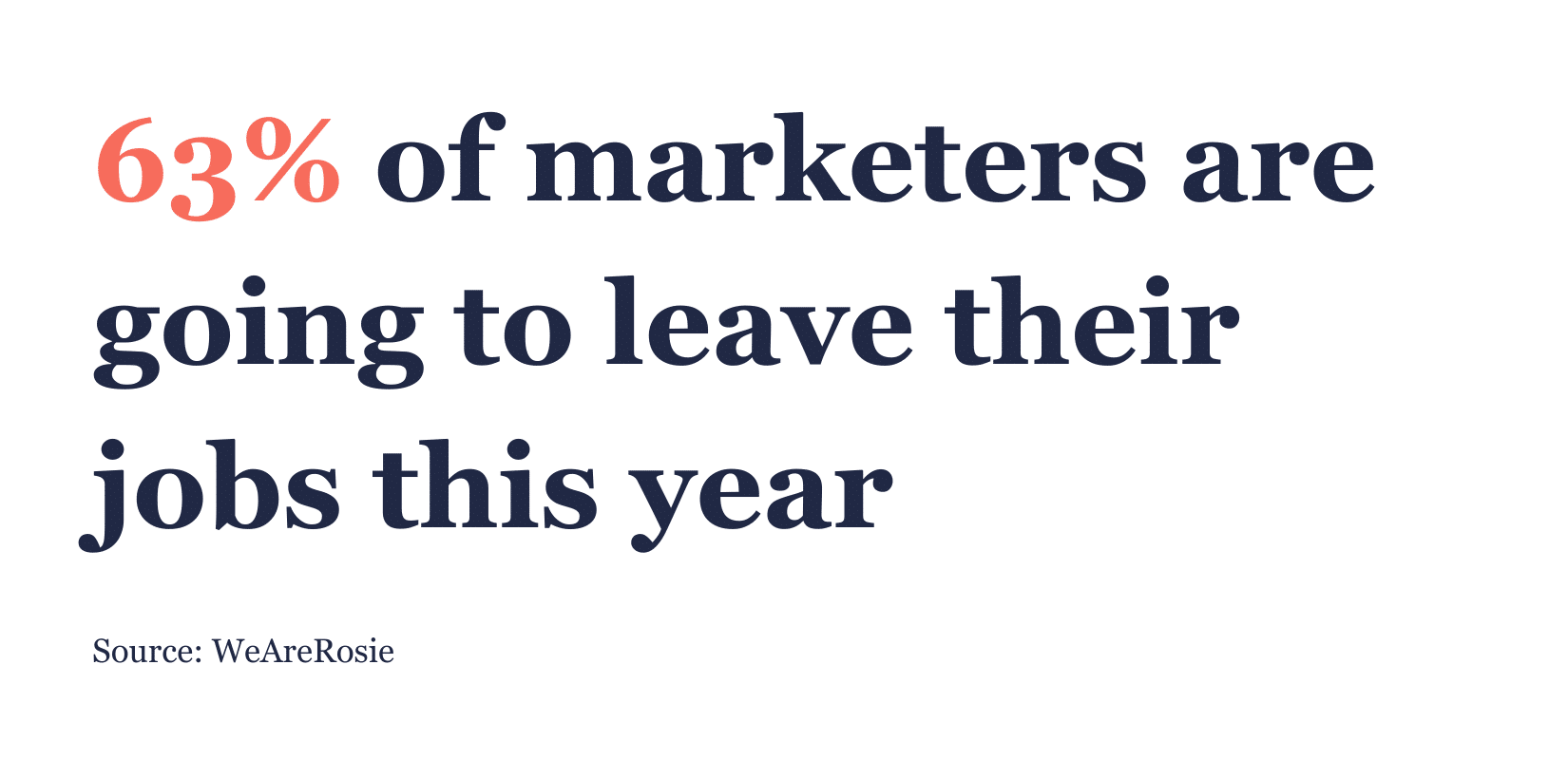Why marketers are leaving their jobs in record numbers

Here in BC we’ve officially entered phase 3 of the pandemic restart plan. For the office world, that means “continued return to the workplace” and “seminars and bigger meetings allowed.” In Alberta, nearly all restrictions have been lifted, and in many States the business world returned to full capacity long ago.
One thing has become painfully obvious as we shift back to office life: Pretty much everyone has used this time away to re-evaluate their priorities.
We’ve been seeing indications here and there that people are looking to make a change, but nothing has been as jarring as this report from talent platform We Are Rosie that found nearly two-thirds of people who work in marketing are planning a career change in the next year.

For those of us looking to retain talent, that’s terrifying news. If you’re looking to attract new people to your team, the report would suggest that just about everyone has a wandering eye and may be open to new conversations. But why now? Wouldn’t you think that, coming out of such a tumultuous time, people would be looking for certainty and stability in their lives?
As we’ve been helping our clients to build their internal teams over the past few months, we’ve been noting a dramatic shift in the way people think about their work, and what they’re looking for from an employer.
Given that everything we do starts and stops based on our people, and our ability to attract and retain a high performing team, we took a stab at figuring out just what is going on, and what we can do about it.
The result? We found that there are 4 forces at work, and 3 things that we can all do to be competitive.
WHAT’S HAPPENING
- The Reprioritization of Work
Time at home and time spent making sourdough instead of spending money dining out has allowed many of us to question whether that hour(+) commute is worth the incremental wage increase, or whether striving for that promotion is more important than time spent with family.
It has also allowed those of us who may not have the luxury of scaling back to find more efficient ways to provide for our loved ones. People who may have previously worked two jobs may have since found a way to do freelance work from home, and others may have done the math, realizing that 50 hours a week, after accounting for fuel, parking, etc. actually nets them less than the more flexible 30-hour-a-week job with a slightly lower hourly rate.
The result is that many of the people who report that they’ll be making a move next year may well be taking advantage of a reprioritization that they’ve identified in their reevaluation of everything.
70% of respondents said that they’ve been highly productive WFH (and during a gosh darn pandemic) over the past year. We gotta trust people to do the work- no more babysitting your employees. They just won’t take it anymore.
— 🌹 Stephanie Nadi Olson (@StephanieNOlson) June 23, 2021
- The Proliferation of Digital
Once upon a time, marketing was a corner of the organization that dealt with ads and branding. Then digital came along and somehow got plopped under the marketing umbrella. Digital quickly grew to become much more than a sales channel, and today encompasses merchandising, commerce, finance, communications, and pretty much every other corner of the company you can imagine.
The impact? Every marketer is a digital marketer, and every experienced digital person has an array of opportunities that spans so much farther than it would have back when all we did was art and copy. So, as the ambitious professionals that we are, digital marketers have taken roles far beyond the scope of what would traditionally have been available to people in the marketing pipeline.
- The Seniority Deficit
As the job postings start to ask for things like “10 years of digital experience” the number of people who truly meet the criteria begin to dwindle. There just weren’t that many of us who were taking the Internet as seriously in 2011 as the business world demands today. Pair that with the proliferation that we discussed above, and it’s no wonder that senior marketing roles are sitting unfilled, and marketers are increasingly starting to stretch for roles that they may have previously thought were out of reach.
When Linkedin is alerting us everyday to another exciting senior role and a brand we admire, it’s no surprise that the majority of professionals are thinking about their next moves.
- The Global Opportunity
Think back to a time when your career ambitions had to be constrained by the distance you were willing to commute. Quaint, isn’t it? Today, marketers are taking jobs across the continent — or across the world — thanks to the miracles of remote work and distributed teams.
We are certainly in the midst of a shift back to much more in-office work, but clever companies are much more open to a geographically distributed workforce than they’ve ever been.
In a world where we’ve reconsidered our priorities, there are more opportunities than ever, and we can apply to jobs anywhere in the world, why would anyone settle for a boring job with a company that we’re indifferent about?
Let’s assume that that’s not your organization. You have great roles for great people, and there is a compelling reason why people should be fired up to work every day. If those things are true, then here are the 3 competitive tactics that we’ve seen work when it comes to retaining and attracting great marketing talent:
*Note: If your roles are boring and the company is uninspiring, then we need to have a bigger conversation before you can move onto this section.
WHAT CAN WE DO?
- Build Roles for Output, Not Input
People want to be accountable for what they create, not how long it takes them to get the work done. How can you shift your team’s accountability to focus on the outputs instead of the inputs? Done right, your team will have the freedom to take charge of their own roles, getting work done when, where, and how they are most effective.
- Turn the Office Into a Resource, Not an Obligation
Most office spaces were built to the specs of the industrial revolution. Like an assembly line, we were packed into workspaces and given the functional tools that we needed to churn out our daily quotas.
Today’s reality is that many people need the resources that are contained within an office, but they don’t want to be constrained by it. Offices provide access to tools like printers and meeting spaces with robust technologies, they facilitate collaboration, and give people a place to get work done that isn’t their noisy kitchen table.
When we can flip our thinking to a resource-focused space, instead of an obligation-bound office, we instantly differentiate ourselves from the majority of organizations that are slow to emerge from the old way of thinking about workspaces.
The future of work is hybrid.
32% never want to go back (esp women w/young kids)
21% never want to be remote (esp singles, empty nesters)To prevent disparities and promote collaboration, where possible, have teams coordinate days onsite vs. remote.https://t.co/t1PWLhkOEw pic.twitter.com/YHABC6qdVf
— Adam Grant (@AdamMGrant) July 5, 2021
- Give Your Internal Storytelling the Same Respect as Your External
Think back to the last time that you had a big company announcement. You probably spent weeks, or months, planning and developing the launch video, the landing pages, and the social media content so the external world would get the best possible version of that story.
How did you break that same story to your internal team? Did you send an email? Write a memo? Perhaps you put in some real effort and hosted a Zoom call.
People are leaving their jobs in record numbers, and one of the key reported reasons is that they feel uninspired, yet somehow we don’t seem to see the value in inspiring our people. Whether you’re a team of 2, or 20,000, your team is aching to do work that lights them up, and the best way to do that is to show them that what they do matters.
If you work for a company that gives people a flexible work environment and a reason to believe in the work they’re doing, then this might be a fantastic time for recruiting talent that may previously have been off the table.
For the companies that don’t fit that criteria, perhaps this can serve as a justification to invest in your people, looking at this next phase of marketing and digital as a chance to differentiate, rather than a line item to be taken care of at the lowest possible cost.
How has your business been affected by the shift in how marketers view their work? What have you been doing to stay competitive? We’d love to hear from you – shoot us an email about your experience: hello@wearejunction.com or tweet at us: @HeyJunction.


